Blog
Why ls my Cat Going Outside the Litter Box?
Release time:
Aug 08,2025
Does your cat ever go outside the litter box? This behavioral problem perplexes and frustrates many pet parents, not only because of the clean-up, but also because the cause isn’t always obvious. We use our cat expertise to develop the best furniture for our feline companions based on research—so, we know a lot about cats and why they do what they do. To figure out why cats start eliminating outside of the litter box.
Why Is my Cat Going Outside the Litter Box?
It can be frustrating when your cat uses your home as their personal restroom. If this happens consistently, then it’s important to figure out the cause as soon as possible because the problem could be medical or behavioral.
The best place to start is by assessing if there have been any changes to your cat’s or your own daily lifestyle. Cats are sensitive creatures of habit, so even things that seem minor to us could throw them off, resulting unwanted behavior. These changes include:
.Unfamiliar cat litter
.New litter box
.You moved their litter box to a new location
.Recent additions to the household, like a new animal companion, baby, or roommate
.Their human has a new job schedule
.A recent move
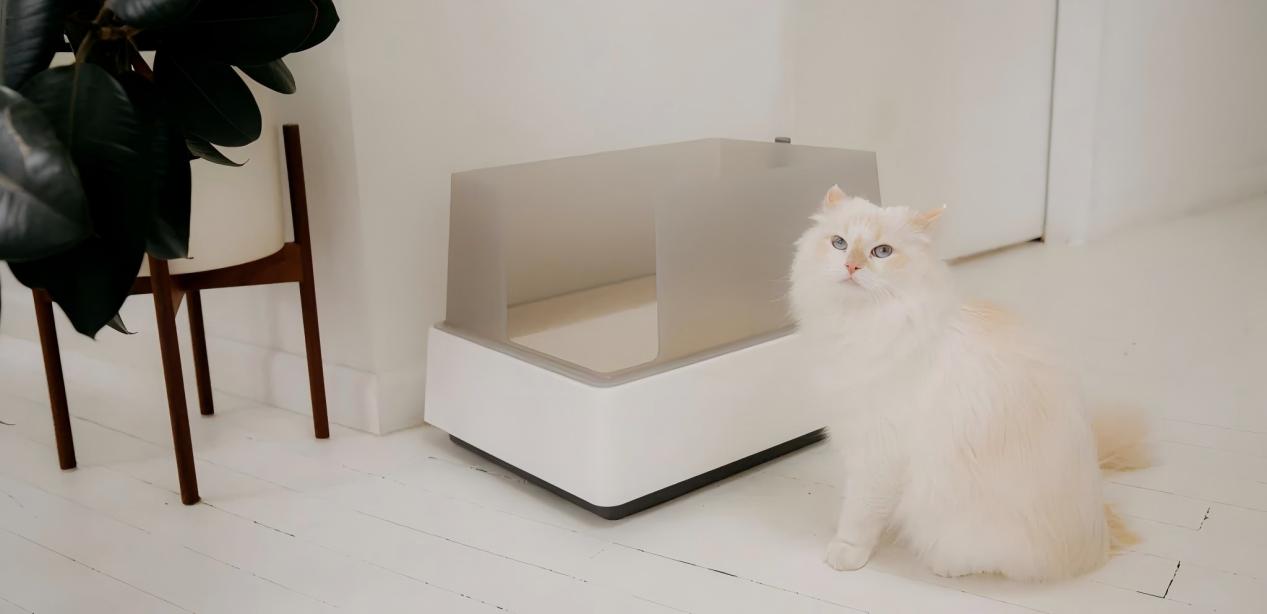
“However, if there are immediate signs of any health concerns during elimination such as blood, diarrhea, excessive vocalization, or odd physical appearance, one should consider consulting their veterinarian,”
Below, we’ll break down the various reasons why this unwanted behavior happens.
1. They Don’t Feel ‘At Home’
Environmental stressors are often the problem when it comes to cats urinating or defecating outside the litter box. Domestic housecats may be only distantly related to their wild counterparts, they still need outlets to exhibit their natural behaviors at home.
“Instinctively, cats must have access to different elements of play/hunt/scratch/stretch to be able to expel these natural desires,” “Not having them may cause the cat to release this energy and stress by displaying unwanted behaviors, such as: eliminating outside the litter box, scratching the side of the couch, jumping on the kitchen counter, or attacking the leaves on the ficus tree.”
This problem is usually fixed by providing your cat with enough enrichment around the home. Scratching posts help satisfy their natural need to scratch—this can also help save your couch, curtains, and area rug. In addition to that, your cat, whether they’re a kitten or in their senior years, should have access to toys that they like to play with. If your cat has snubbed every toy they’ve been given, don’t give up. Cats can be finicky creatures, just like us. Try engaging your feline with new toys to uncover their personal preferences.
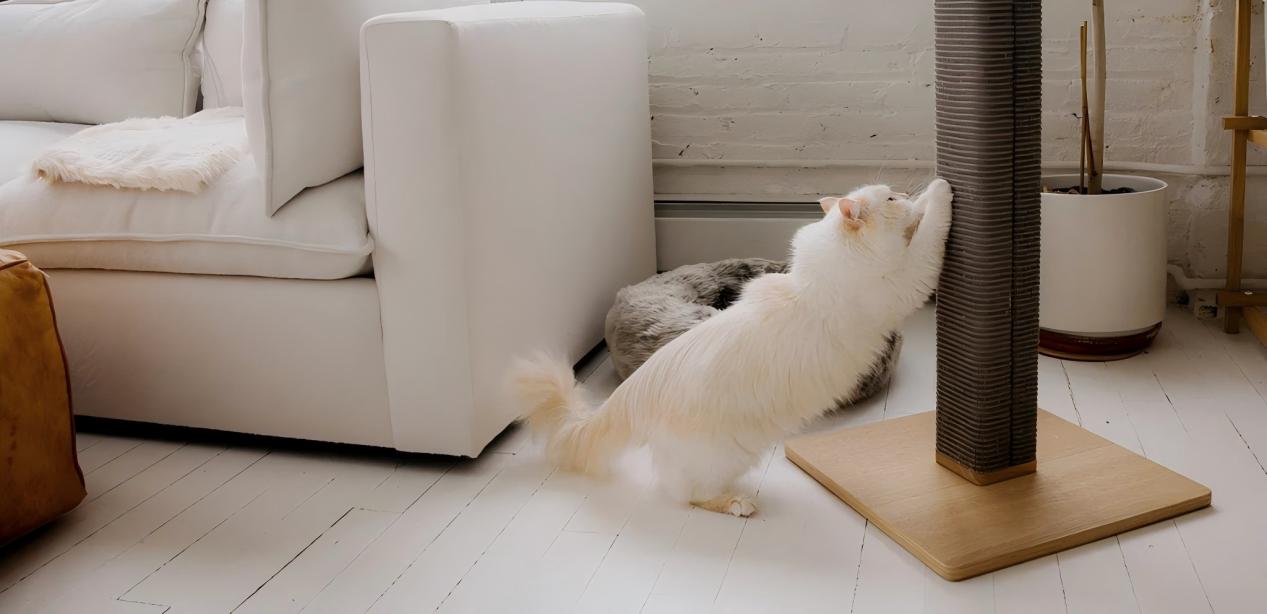
If you live in a multi-pet household, it could be that conflict with other animals is causing your cat’s litter box problem. Cats are territorial creatures, so they may perceive a new animal in their residence as a threat. See here for tips on introducing your cat to the new pet.
You should also ensure that each pet has access to places to perch, nap, scratch, and use the litter box.
“Ideally, the number of litter boxes in a home should equal the number of cats plus one,” One cat should have two litter boxes, two cats should have three litter boxes, three cats should have four litter boxes, and so forth.
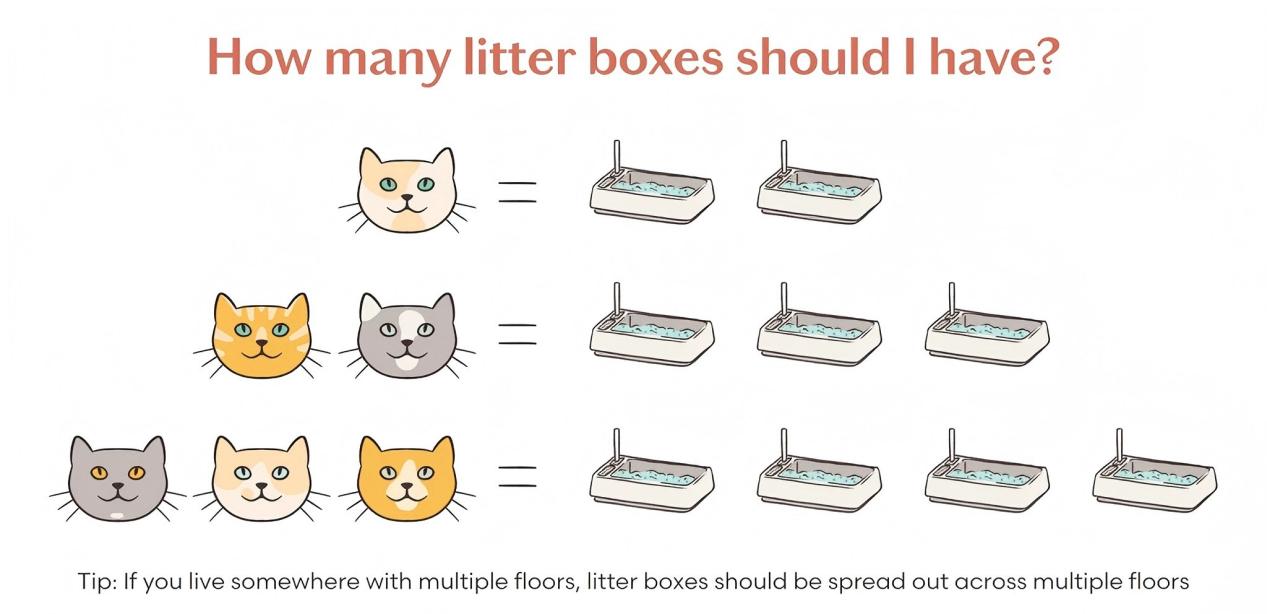
“This allows the opportunity for each cat to claim one litter box for their own personal use but ensures there is always a litter box available if the others are currently being occupied”.
The same applies to water bowls. Ideally, there should be two water bowls per cat.
2. Medical Problems
One or more health issues could cause your cat to go outside of the litter box. This is why it’s so important to promptly get your pet checked out by a vet if you’ve ruled out the other issues.
Feline Lower Urinary Tract Disease (FLUTD)
Feline lower urinary tract disease (FLUTD) is one of the most common causes of cats urinating outside of the litter box. FLUTD is a general term that refers to a number of conditions that affect a cat’s bladder and urethra. It can happen to any cat, but it’s most common in overweight or middle-aged cats.
FLUTD’s symptoms include:
.Frequent of longer attempts to urinate
.Crying out while trying to go
.Blood in the urine
.Frequent grooming of the genital area
.Eliminating outside the litter box, typically on smooth surfaces like tile floors and bathtubs
Because this condition can have many causes, it’s important to bring your cat to a veterinarian for a physical examination as soon as possible to obtain a diagnosis.
Feline Idiopathic Cystitis (FIC)
Feline idiopathic cystitis (FIC) is one of the most common causes of FLUTD. This diagnosis is given once all common or known causes of your cat’s improper elimination behavior have been ruled out. This condition is often caused by stress, which can include the introduction of new pets or changes to their environment. This issue is usually resolved in a matter of weeks by enriching your cat’s life with a regular feeding schedule, a clean litter box, safe areas to play and rest, and access to clean, fresh water.
Bladder Stones
Bladder stones, hard deposits of minerals that form in the urinary tract, are another cause of FLUTD. Struvite stones, which are made from ammonium, phosphate, and magnesium, are the most common form of bladder stones. If your veterinarian suspects bladder stones, then your cat may undergo X-rays to determine the quantity and size. If your cat is diagnosed with bladder stones, they may be fed a prescribed diet to dissolve them or undergo removal surgery.
Urethral obstruction, which is more common in male cats, is possibly the most dangerous of the FLUTD causes. This potentially life-threatening condition involves the blockage of the urethra by stones or other particles, leaving your cat unable to urinate. Other sypmtoms include nausea, appetite loss, vomiting, and blood in the urine. A urethral obstruction is a medical emergency that must be treated immediately, as it prevents the removal of toxic waste from your cat’s body.
Additional Causes
A urinary tract infection (UTI), which is more common in older felines. It’s caused by bacteria in the urine and must be treated with antibiotics. Eliminating outside the litter box could also be the result of a variety of metabolic diseases that affect the kidneys, thyroid, or liver. If it feels like you need to clean your cat’s litter box more often, a trip to the vet is in order.
Additional causes could be arthritis pain (especially in older cats), blindness, diabetes, hyperthyroidism, and cognitive dysfunction such as dementia.
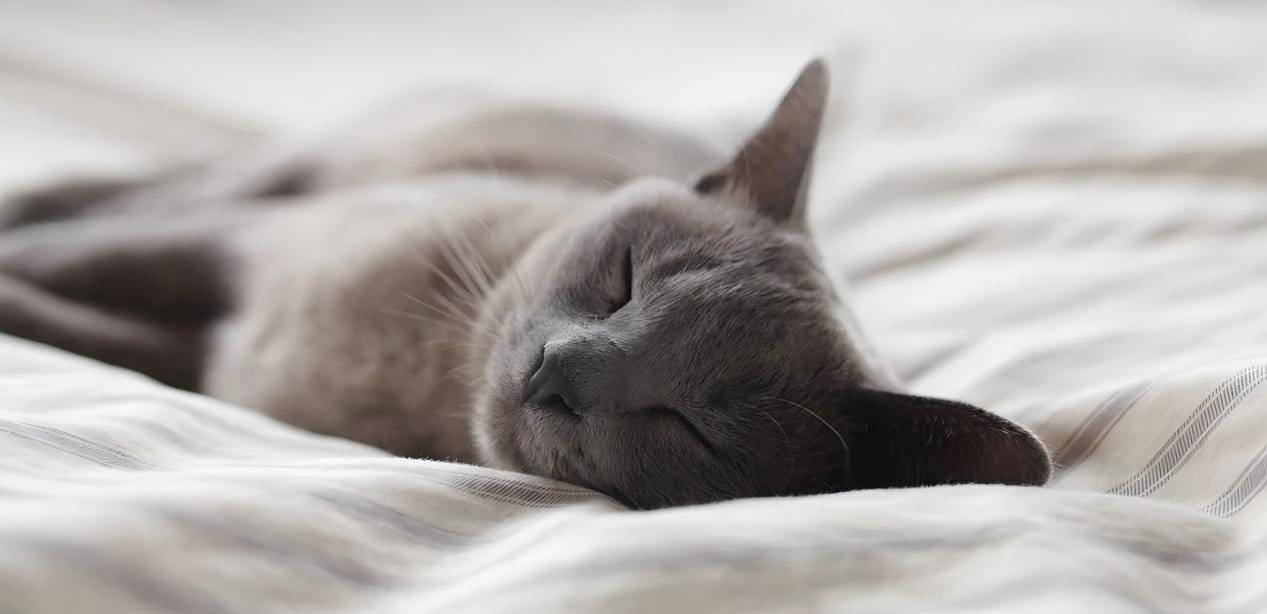
- There’s a Problem With the Litter Box
Sometimes the litter box itself is the problem. Ask yourself the following:
.Is the litter box clean?
.Are there enough litter boxes around the home?
.Is it the right size for my cat?
.Is it in a comfortable space?
.Could the litter be the problem?
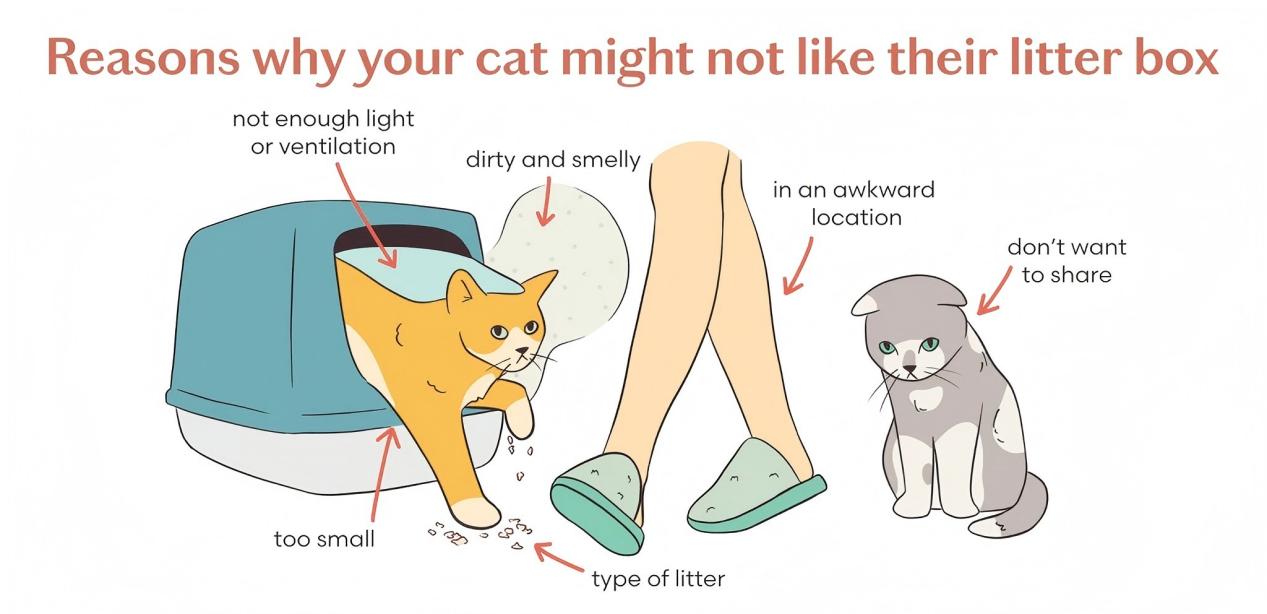
How to Fix the Problem
Cats like a tidy bathroom. Ideally, you should clean the litter box once every other day. But if you have a multi-cat household then you might need to clean it daily. Second, make sure that there are enough litter boxes. The golden rule is to have one litter box, plus one extra per cat.
If the litter box is too small, then your cat may opt to do their business elsewhere because there’s not enough space to maneuver. The box should be one-and-a-half times the length of your cat, from their nose to the base of their tail, and should be as wide as your cat is long.
As for location, the litter boxes should be placed in a quiet space that’s separate from where your cat eats and drinks. It should be private, but not completely isolated. If your home has more than one story, place a litter box on every floor of the house.
Your cat might also not like the litter you’re using. Most cats prefer soft, sandy-feeling litter to larger granules. Dust and fragrance may also cause your cat to seek facilities elsewhere.
- Your Cat Might Be Spraying, Not Peeing
Appearances can be deceiving. It may look like your cat is peeing outside the litter box, but they could actually be spraying, also known as urine marking. Cats are territorial beings and like dogs, they communicate through smell. A cat sprays to tell other cats to “back off.” While this spray is made from urine, it’s a distinct from regular elimination.
How do you tell the difference? If your cat is squatting, then they’re urinating. But if your cat backs up towards their target, like a wall, with their rear raised and tail erect and quivering while eliminating, then they’re spraying. This behavior can be a result of any of the above reasons, such as new pets, other environmental stressors, and medical issues.
In Conclusion…
Dealing with a cat who’s been going outside the litter box is frustrating, especially because our they can’t talk to us. and tell us what’s wrong, But, knowing the signs to watch for could help you figure out and fix the problem, whether it’s an underlying medical issue or a need for more scratching posts around the home.
Liked what you read? Get in touch with us via email:
Releated Blog
How to choose the right litter for your kitty
Jul 02,2024
Why ls my Cat Going Outside the Litter Box?
Aug 08,2025
Apr 10,2025






